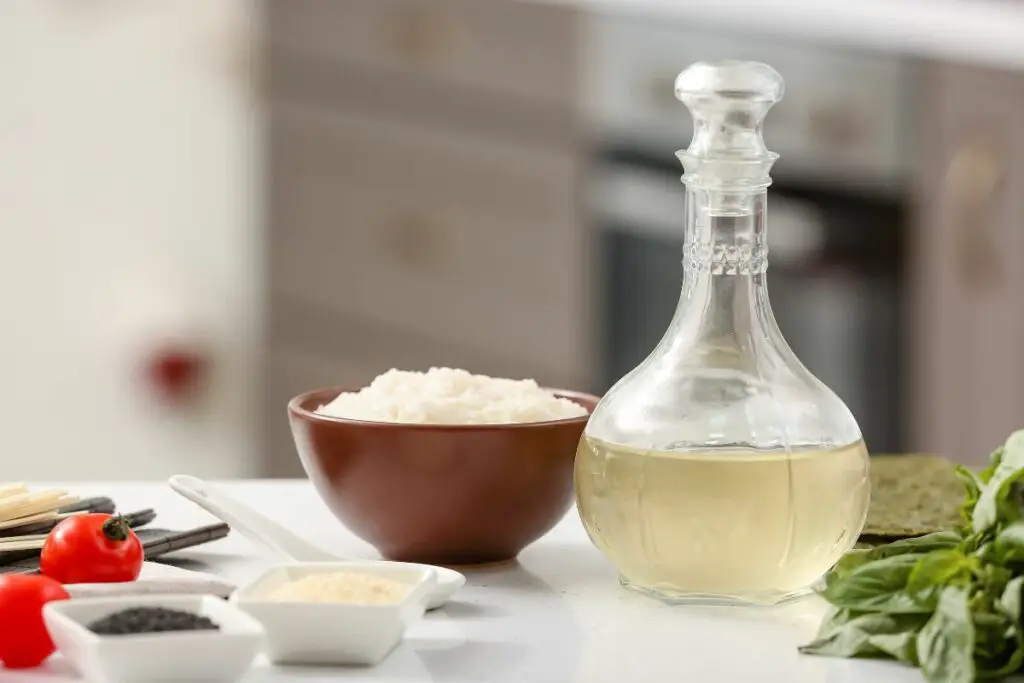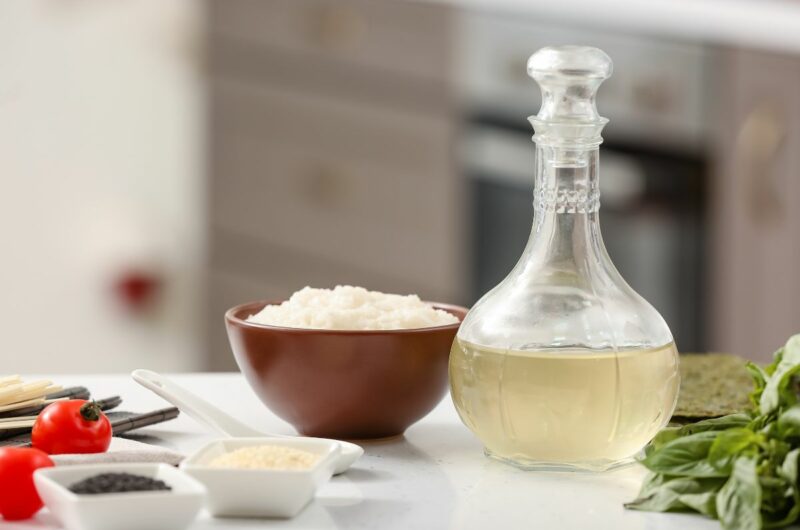Rice vinegar is one of the most important ingredients that you can have when it comes to extra ingredients to have in your pantry, especially if you are specializing in Central and East Asian cuisines.
For many recipes, having rice vinegar at the ready isn’t just a nice extra flavor to have handy, but a vital necessity!
So, what exactly do you do when you’re in the middle of cooking, reach for the rice vinegar, only to find that there’s none left in the cupboard?
It is just niche enough that you can’t always rely on your local store to have some, and it’s essential enough that finishing a recipe that calls for it is like ordering a pizza with no tomato or cheese!
Luckily for you, there are a few substitutes that you can use if all of the rice vinegar has been used in your kitchen. All of them have at least some of the qualities of the aforementioned ingredient, whilst also bringing something new or interesting to the table.
We’ll cover all of them in this guide that we have collected for you here!

What Is Rice Vinegar?
Before we get stuck into the replacements, we should probably explain what exactly rice vinegar is, and what makes it so great in the first place. That way, you’ll have a sense of what you should be looking for in a good substitute!
Rice vinegar is exactly what it sounds like: It is a type of vinegar that is made by fermenting rice in a two-stage process, first by converting the sugars in the rice into alcohol (making it rice wine), then fermenting it again to add the acidity that vinegar is known for.
You can find rice vinegar in a variety of colors, from clear white to brown, to black, and even red.
As we already mentioned, rice vinegar is a staple in many Asian recipes, where it adds a distinct acidity to a recipe, that also happens to have some sweeter elements to it too.
This makes rice vinegar noticeably milder than traditional white vinegar or red wine vinegar. So, ideally, a substitute would be looking to replace this key aspect in some way.
1. Apple Cider Vinegar
Starting with arguably the best substitute that you can use for rice vinegar, we have possibly the sweetest kind of vinegar that you’ll find out there, apple cider vinegar.
Made from fermenting apples in a sweet and acidic condiment, this particular ingredient has pretty much all of the aspects that you will be looking for in a good rice vinegar substitute.
It has a similar acidity to rice vinegar, while also being sweeter than other varieties, making it a perfect 1:1 substitute in cooking for most recipes.
Plus, you may find it easier to find apple cider vinegar than some of the other substitutes in this guide.
The only area where we would consider apple cider vinegar to fall short is when it comes to cooking or soaking vegetables, or perhaps when it comes to pickling. You’ll find that your pickled items may come out a little too sweet!
2. White Wine Vinegar
We mentioned how many types of normal vinegar that you might have easy access to, like regular vinegar and red wine vinegar, are just too acid-flavored to be used as substitutes.
However, you’ll find that, when compared to these two, white wine vinegar does the job quite well of filling the same roles as rice vinegar.
While arguably not quite as sweet as rice vinegar, and with noticeably higher acidity, white wine-based vinegar is far more workable than red wine vinegar or the regular stuff, as it has a noticeably milder acid flavor to it.
Simply add a quarter of a teaspoon of sugar to your white wine vinegar, and you’ll be good to use it in the same recipes as your missing rice-based condiment!
3. Lemon/Lime Juice
Of course, if you’re looking for sweetness and a little acidity, and don’t mind a big helping of sourness in that mix too, you can’t go wrong with lemon or lime juice as a substitute!
Citrus fruits like lemon and limes carry plenty of that classic acid texture that you’re looking for in a good substitute, making them ideal as a substitution, as well as adding a little sweetness to whatever you are cooking up!
The only thing that you’ll need to consider is that adding enough lime or lemon juice into a mix to work as a substitute is going to affect the final taste of your recipe, giving a much or citrus, fruity flavor than you otherwise might intend.
4. Sherry Vinegar
As the name would suggest, this particular type of vinegar is made from sherry wine, giving it a whole heaping of unique characteristics that can make it a surprising fit for a rice vinegar substitute.
Sherry, thanks to its fermentation process, doesn’t contain that same bitterness that regular vinegar often has, while also being surprisingly sweet, making it a surprisingly good substitute for rice vinegar. Plus, you’ll even be getting a ton of extra flavors from the sherry vinegar, with its nutty and rich flavors!
Of course, using sherry vinegar instead is bound to affect the flavor of the final product, so make sure that you’re accounting for that too!
5. Champagne Vinegar
Champagne vinegar has many of the same hallmarks as both rice and white wine vinegar.
Because of this, you’ll find that the light flavor and acidic taste make it a pretty good substitute for most cooking scenarios, whether you’re creating a dip, or marinating your food.
6. Rice Wine
Rice wine is technically the product that is made from the first fermentation process that rice vinegar goes through.
So, it stands to reason that it also should make for a pretty good substitute for the latter, seeing as how they are so similar to each other!
This particular substitute leaves you with a flavor that is very similar to rice vinegar, thanks to its sweet alcoholic flavor. However, you won’t get that same acid taste that you would find in a vinegar product and have a particularly sweet flavor to your recipe.
Not our first pick, but manageable if you leave out any other sweetening agents in your recipe.
7. Seasoned Rice Vinegar
Seasoned rice vinegar is pretty much exactly what it sounds like, a type of rice vinegar that has been seasoned with extra sugar or salt.
This makes adding this ingredient a great way of avoiding adding extra salt or sugar to a recipe, while still getting that ricks, slightly sweet flavor.
Now, is this option considered cheating slightly? Given that this is arguably just rice vinegar but with more steps, some readers might be inclined to think so.
However, it is still its distinct ingredient in many recipes, so there is a good chance that you might have some seasoned rice vinegar handy when you’ve otherwise run out of the regular stuff.
8. Balsamic Vinegar
Finally in this list, we have an ingredient that many lovers of Mediterranean cuisines will be well familiar with.
With a powerful, yet still surprisingly mellow flavor to it, it probably shouldn’t be too surprising that balsamic vinegar is such a popular substitute. Plus, it’s an option that many people are likely to have in their pantries!
Again, balsamic vinegar probably isn’t our first pick when it comes to optimal substitutes for rice vinegar (it’s why it’s at the bottom of the list for us).
The bitter flavor, while not as strong as in regular vinegar, is still very noticeable, more so than in rice vinegar.
However, if you’re stuck in a corner, with none of the other substitutes that we have discussed handy, this is a reliable ingredient that will have you covered!
Final Notes
So, there you have it!
Not all of them will be ideal substitutes for every rice vinegar recipe. But, when there are no other options, these ingredients will do nicely!
8 Best Rice Vinegar Substitutes
Course: Substitutes4
servings30
minutes40
minutes300
kcalIngredients
Apple Cider Vinegar
White Wine Vinegar
Lemon/Lime Juice
Sherry Vinegar
Champagne Vinegar
Rice Wine
Seasoned Rice Vinegar
Balsamic Vinegar
Directions
- Decide on what substitute you need
- Pick a substitute from the list above
- Read what you need to substitute with
- Create the recipe and enjoy
Recipe Video
https://www.youtube.com/watch?v=w82z1SYVd40Video can’t be loaded because JavaScript is disabled: Brown Rice Vinegar (https://www.youtube.com/watch?v=w82z1SYVd40)- What Exactly Do Chickpeas Taste Like? Is There A Distinct Flavor? - September 30, 2023
- Top 11 Low Carb Options at Sonic Drive-In for Keto Diet - September 30, 2023
- What Should You Serve Alongside Potato Salad? 8 Incredible Side Dishes - September 30, 2023











